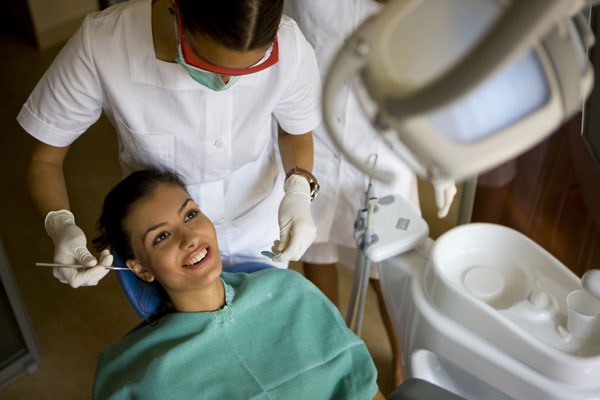The average adult has thirty-two teeth by age 18, sixteen on the top and sixteen on the bottom. Wisdom teeth are the last teeth to come in. They usually start to appear in the teen years. When they align properly, and gum tissue is healthy, wisdom teeth do not have to be removed. Wisdom teeth can be impacted, which means they have nowhere to grow. In these cases, they should be removed. This can usually be determined by 16 or 17 years of age. Removal of wisdom teeth in this age group is recommended, because the roots are not fully formed and the bone surrounding the impacted tooth is sless rigid, making surgery less traumatic. Because these teeth come in the teen years, or the age of wisdom, they are called “wisdom teeth.”
Problems of Impacted Wisdom Teeth
Even though impacted wisdom teeth are not visible, they can cause a number of problems, including pain in the back of the jaw. The pain may be caused by the tooth itself or by an infection. Bacteria in the mouth can work its way under the gum tissue and cause a painful infection that may include swelling, stiffness and illness. The infection can worsen and lead to gum disease. The destruction can also extend to other teeth and may result in tooth loss. Because the pressure from erupting wisdom teeth can move other teeth and disrupt the alignment of teeth your orthodontist may request wisdom teeth extraction prior to braces.
Before the Procedure
Prior to surgery, it is common to have a consultation with your oral surgeon. You will be evaluated for those contributing factors that could affect your procedure. After the evaluation, a decision will be made as to the most appropriate setting for your procedure. The vast majority of these procedures are performed in an office setting.
Preparing for Surgery
- Wear loose, comfortable clothing with sleeves that roll up
- Remove all jewellery and watches
- You need to have an escort to get you there, wait for you during the procedure and take you home afterwards.
- The procedure is rarely more than an hour. Recovery is usually a half hour
- Do not eat for six hours prior to surgery
- Do not drink for six hours prior to surgery. EXCEPT a small Amount of water used to take your normal medications
Surgery
Improvements in surgical technique and sedative medicines allow you to have your impacted wisdom teeth removed comfortably and efficiently in a pleasant environment. Your oral surgeon will numb the area to lessen any discomfort and you will be anaesthetized. A small rubber cushion is placed between your teeth before you go to sleep to keep your mouth open. After the extraction, you may experience a small amount of bleeding. This is completely normal. If the area is not closed with stitches, a pressure pack made of folded sterile gauze will be placed over the socket.
After Surgery
After surgery, some swelling is to be expected. This can be controlled through the use of cold packs. A cold pack can be used during the first 24hours in a cycle of 20 minutes on,20 minutes off, After the first 24 hours it is advisable to rinse with warm saltwater every two hours to promote healing. Use one teaspoon of salt to eight ounces of warm water. Following your surgery, it is vital that you contact your dentist if you experience excessive bleeding, swelling or pain.
- Do not disturb the wound
- Do not smoke for, 12 hours
- Do not spit or suck through a straw
- Chew on the opposite side for the first 24 hours
- Use aspirin and Ibuprofen, to help control minor discomfort
- Eat a soft diet the first few days after surgery
Dry Sockets
A “dry socket” is when the blood clot is lost prematurely. The blood clot in the socket serves the same purpose as a scab on your skin. If this occurs, the oral surgeon can pack the site with materials and chemicals to help ease any discomfort. Usually patients return to have the pack changed every day or two. Most patients do not require more than two or three dressing changes. Dry sockets may be painful, but are otherwise harmless. Not following after-care instructions, smoking, spitting, drinking carbonated liquids or sucking through a straw can increase the chances for dry socket.
It is important that you talk to your dentist about the extraction procedure, risks, possible complications and results of removing these teeth. In any case, it is important that you have regular dental checkups and that your wisdom teeth are monitored.

